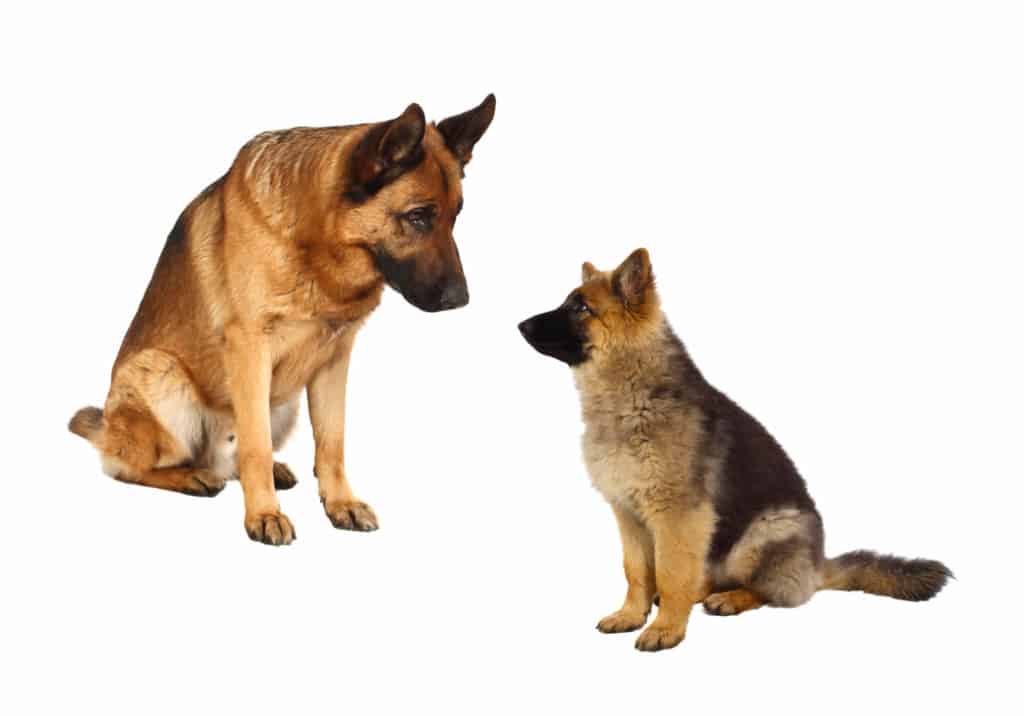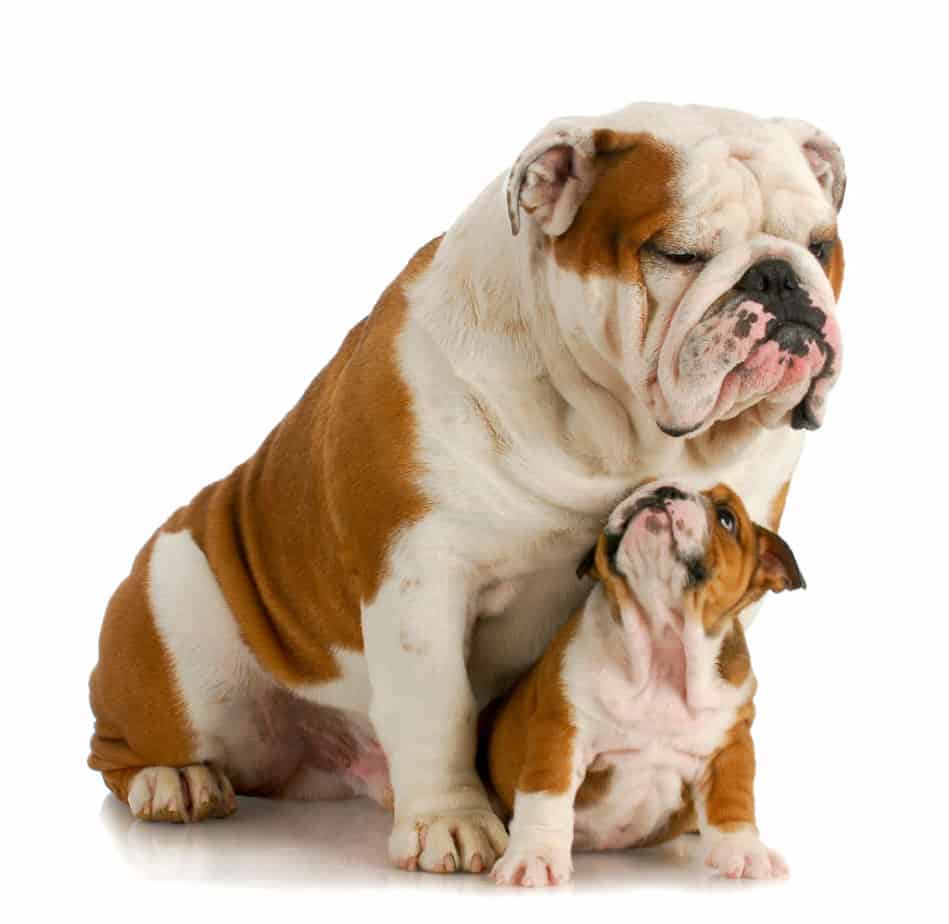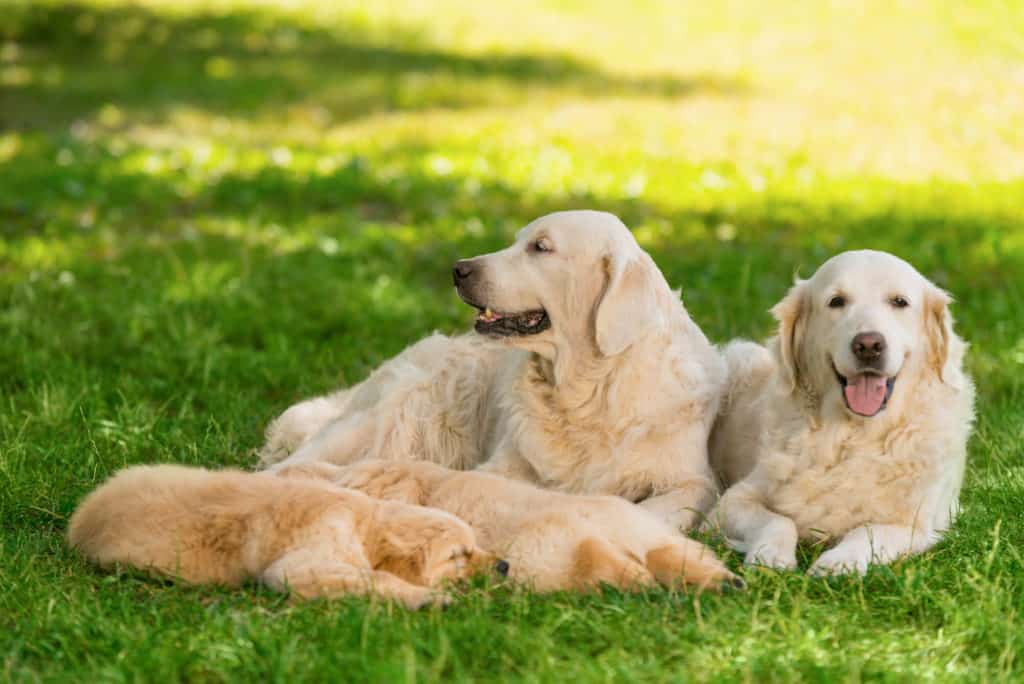Unfortunately, the short answer to this question is no. It’s been fairly established that male dogs typically don’t recognize their puppies and show signs of indifference towards them. Yet, they have a generalized parental instinct towards all puppies in the pack.
Whether you’ve received a new litter of puppies or you’re curious about the nature of dogs, you might be wondering “does a father dog know his puppies?”
Can a Father Dog Recognize His Puppies?

The relationship between adult dogs and puppies in their litter is quite complicated, whether these puppies belong to them or not.
Ideally, most breeders and dog owners noticed that father dogs don’t seem to actually recognize their own puppies, although it’s very difficult to fully conclude that.
For instance, Adult male dogs are capable of understanding the concept of having a new litter introduced to the household.
Also, a male dog will see the puppies as new immature members of its pack that are not fully grown and require special treatment.
In other words, they won’t treat them with the same hostility toward foreign dogs. Additionally, they won’t exactly treat them as they treat other adults in the pack
Surprisingly, An adult male dog should be able to recognize which particular litter belongs to which mother by observing the strong parental instinct between the mother and its puppies.
Despite that, it will treat all puppies in the household equally, whether they belong to them or not.
Do Male Dogs Have a Parental Instinct?
The concept of recognizing your offspring and showing parental instinct is deeply intertwined in our heads because humans are hardwired to do both.
However, when it comes to male dogs, recognizing a puppy and showing parental instincts are two separate things.
Although male dogs may not be able to recognize their own puppies, they still technically have some parental instincts.
The interesting part here is that this parental instinct isn’t exclusive to their own puppies. Instead, they’ll usually treat all dogs of their pack (or household) equally.
On the other hand, mother dogs will not only recognize and nurture their puppies, but they’ll also reject litters that aren’t their own.
Helpful Dog Training Resource:
For help with training your dog, you should take a look at The Online Dog Trainer by Doggy Dan. Doggy Dan is an expert Dog Trainer based in New Zealand. His online resource contains Hundreds of Excellent Dog Training Videos that will take you step-by-step through the process of developing a healthy, happy well-behaved dog.
Why Do Male Dogs Lack a Strong Parental Instinct?
While there’s no particular reason why dogs don’t have a strong parental instinct, there are a few ideas that may explain this unique relationship. Let’s have a quick look at the most prominent ones:
No Hormonal Bond
One of the main reasons behind the lack of parental instinct in father dogs is that they establish any hormonal bond like the one shared between mothers and their litters.
When a mother dog gives birth to her newborn puppies, her body releases various hormones that have deep association with affection and attachment, particularly the oxytocin and estradiol.
On the other hand, father dogs don’t release any special hormones during that process, which is one of the reasons why there isn’t an instinctual bond between them and their own puppies.
They’re Built Different

One school of thought explains the indifference of the father dogs toward their own puppy is simply because “they’re built differently”
According to this idea, dogs simply don’t play by the same rules as humans do. For instance, humans are predominantly family-oriented creatures with particular roles in which fathers share in the nurturing process of their young.
On the other hand, dogs are pack-oriented creatures in which females and males have different roles and duties.
Since males don’t participate in the nurturing process, the pack’s chances of survival will be higher if all adult males generalized their parental instinct over all puppies of the packs, so there’s no need to recognize a particular litter over the other.
Possible Human Intervention
Despite the previously mentioned theory, we can see male wolves and wild dogs in nature recognizing and caring for their own litter.
As a result, some experts believe that human intervention may have had an impact on the breeding and raising of puppies among dogs.
Unlike wild dogs and wolves, adult males don’t need to protect the household or provide food, so they don’t need to teach their puppies any particular roles in that regard.
Helpful Dog Health Resource:
Note: Our Health is #1 Priority. It should be no different for your dog. But you need to help him. The Ultimate Guide to Dog Health is the answer. This handy guide will help you recognize the symptoms of the health problems above. Get the knowledge to stay ahead of these terrible issues that can rob your lovely dog from vigor and life. Help your friend make it to 14 yrs+ without pain and suffering.
How Do Father Dogs Treat Their Puppies?
Since each dog has its own personality, temperament, and set of traits, each dog will react differently to puppies, whether it’s their own or not.
For that reason, it’s extremely important that you’re always careful when you introduce a puppy to its father for the first time ever.
This is because some father dogs will actually react aggressively toward their puppies. In most cases, the aggression here is only due to jealousy.
The reason behind that is that the new litter and mothers usually get much more attention than the adult at that time.
On the other hand, most adults will simply show indifference towards the puppies and you won’t notice any different reactions towards them past the initial curiosity about the new members of the household.
With that said, some dogs will show a surprising level of affection towards the new litter, and you’ll see the male playing with the puppies and even cuddling them.
But remember, this is quite rare, even among particularly affectionate breeds.
Is It Safe to Keep the Father Around Puppies?

Since we don’t usually have a clue how a dog will react to their puppies, it’s usually best to err on the side of caution and avoid any interactions between the two for some time.
Ideally, you need to keep the father away from the litter for a period of 15 to 20 days in order to pass the critical newborn period where puppies are extremely vulnerable.
It’s also important that you don’t extend the separation period between the father and his puppies in order to create social interaction between the two under your supervision.
Additionally, even if fathers are indifferent toward their puppies, a well behaved father will set an example for the young ones, which will make them easier to raise and train.

Paul has been creating content for the dog niche for many years. The information he shares comes his first hand experience growing up in dog lovers household and then owning multiple dog breeds of his own as an adult. Paul enjoys doing the hard research to collect, analyze and present our dogtemperament.com readers with the best answers to their questions.